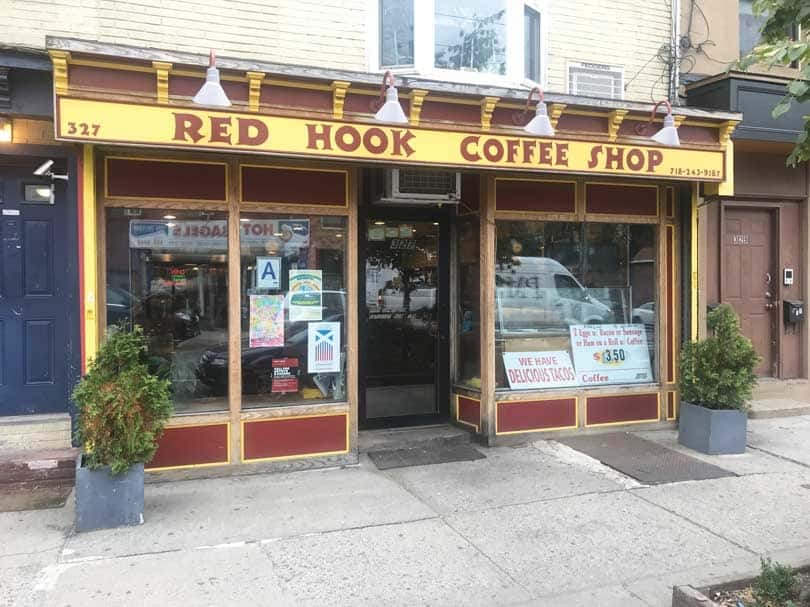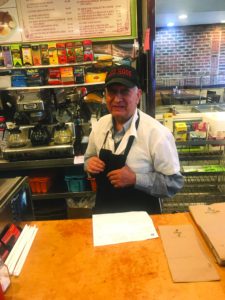
It’s 4:30 on Monday morning. An empty school bus rolls up Van Brunt Street. The flag outside the VFW flaps in the pre-dawn October chill. And the plate glass windows of the Red Hook Coffee Shop shine brightly in the dark, illuminating 80 year old Jose Antonio Piraquive, aka Tony, kneeling on the floor putting vegetables into the refrigerator.
Tony hasn’t missed a day of work due to illness or other symptom of human weakness since 1973, when he opened his first restaurant in Williamsburg. “I said to myself, ‘I’ve got to work. I’ve got to make a good future for my daughters,” remembers Tony. “I think my medicine, what keeps me healthy, is the responsibility.”
There can be no doubt that Tony has borne that responsibility well. The Red Hook Coffee Shop is a holdover from a time when the neighborhood’s businesses served truckers and factory workers—hence the early hours—but Tony’s discipline and acuity put both of his daughters through college and provided comfortably for himself and his family. Yet, after many years of early mornings spent on Van Brunt Street, Tony will be hanging up his apron and retiring in a matter of months, or even weeks. “No matter what you do in life, it always comes to an end,” Tony reflects. ”I feel strong still, I want to still work, I love to work. But, in the same way, I’m eighty years old. It’s a lot of years.”
Tony was born and raised in Bogota, Colombia, and came to New York City in 1963 at the age of 21. “I love New York,” says Tony. “This is the most beautiful place in the Earth. All kinds of people go together here, no problem. It’s like a big symphony, there’s different nationalities but everything is harmony.”
Shortly after arriving Tony enrolled in an English course at New York University while working in an auto body shop. One day in 1964, it was raining, and business was slow. Never a man to waste a productive day, “I said, ‘how can I kill this day?’ So I went to the unemployment office to get a better job. I wasn’t looking for a job, I was looking for a better job.”
What he found instead was a wife—after translating for a young Colombian woman he met at the unemployment office he gave her a ride back to her home in Corona, Queens. She introduced him to his future wife, who was “a young girl, all that, and more beautiful than the other one, so I liked her!” He lent his future wife some English books from NYU, and within a year they were married with a daughter on the way.
“My wife is very sophisticated, very educated,” says Tony. “If we met in Colombia we’d never get married, because over there, with the classes, the last name is very important.”
Over the next few years Tony got two degrees—one in electronics and another in computer technology. Immediately after graduating from the latter he got a job as a computer engineer, but he didn’t like the company culture. “I was used to being face to face with the owner of the business, and here I was a number,” remembers Tony “I didn’t like that, so I quit and went back to the body shop. Today, I realize that was a big mistake [to leave computer science].”

1973 was a big year for Tony—it was the year his second daughter was born, the last time he got sick, and the year he decided to “go independent.” His daughter’s godfather owned several coffee and donut shops, and he offered Tony the chance to be part owner in one for $10,000.
“He set up the place very easily, with maybe $5000,” remembers Tony. “Now, it’s very difficult to start your business. In those days, you could decide everything yourself, no big deal. There were no regulations, no nothing in those days.”
The coffeeshop thrived.
“In those days there was really tremendous business, because there was still a lot of factories here in Brooklyn, a lot of activity,” remembers Tony. Everybody made money. There were a lot of working people, a lot of factories.”
But there were some difficulties—Tony says he was almost run out of business by his own employees, who would steal from the cash register. “In those days there was no cameras, no nothing. So for six months I was selling a lot, but there was no money! I started to say, ‘what the hell is going on here?’ Then I realized I had to be in the front of the business all the time.”
Eventually he bought out his daughter’s godfather. His rent in Williamsburg was $2500 (a lot in in 1985), and when one of his customers told him about an available storefront in Red Hook going for only $600, he jumped on it without really giving the neighborhood itself much thought.
“I don’t know how I made it here, to be honest,” says Tony. “I didn’t know Red Hook. I just saw the business, and I came. And people started to tell me ‘you’re going to Red Hook, are you crazy? Are you stupid? They’re going to kill you!” But he says he’s never had any problems.
It’s now 5:30, and Tony’s first customer of the day enters the shop, buys two coffees, and leaves. “25 years ago, this hour was extremely busy,” remembers Tony. “Busy, busy, busy, busy. And now it’s nothing, because now there’s no people, no enterprise. There was tremendous activity here.”
He says this matter-of-factly, and it’s hard to tell whether Tony is nostalgic for those earlier times or feels content in the knowledge that it’s all the work of the invisible hand. “I think this is the country of opportunity for everyone,” Tony says. “Here, people who want to make it, he makes it. People who want to work, they get a job.”
The American dream came true for Tony, at least—his hard work put both of his daughters through school and has allowed him and his family to travel and enjoy sophisticated tastes. “One of my daughters is a lawyer, she’s independent, she’s got her own office, her own business. Very respectable, very disciplined,” says Tony. “The other one, I cannot complain. She’s worked almost fifteen years for the Department of Education as a psychologist. She’s pretty smart, too.”
Tony is a regular at Lincoln Center—he played Tchaikovsky and Beethoven in the coffee shop until he realized it was alienating his blue-collar clientele—and is looking forward to spending more time playing chess with his grandchildren.
“I like to travel,” says Tony. “I went to Europe already, so I’d like to go again. I’d like to go to China. China, I like the history, I’d like to see the Wall. I’d like to see the Galapagos, maybe the culture of the Incas in Peru. And I like to read a lot, so I’ll have time to read a lot.”
It’s almost six o’clock in the morning, and Tony is behind in his work because he’s been talking to me. During our whole conversation, he’s been working: he’s finished putting the vegetables away, cleaned the grill in the kitchen, and made the coffee. His tone has been cheerfully stoic, the tone of a proud man who chose independence and self-improvement and is satisfied with the result. He now politely begins to hint that it’s time for me to leave so he can get on with his work. Before I go, I ask him how he feels about leaving Van Brunt Street, where he has spent so many years. “You don’t seem very emotional,” I say.
“Oh yes, I am emotional,” he says. “This is like, better than my house. I’ve spent half of my life here. Really, I feel very sad. Like I said, I never had problems here. But, everything comes to the end, you know what I mean? I feel good, I feel my mind is working properly, and my body, I don’t take no medicine at all, nothing. So, so far so good. I’d like to come back twenty years from now and see the wonder of Red Hook. Red Hook is a tremendous place. It’s going to be beautiful, the water, the big buildings. When the big money comes here, it’s going to be a tremendous place here.”









One Comment
I love his story never knew he was back there that long. Good luck to him he still has a lot a life in him. Keep the body moving.